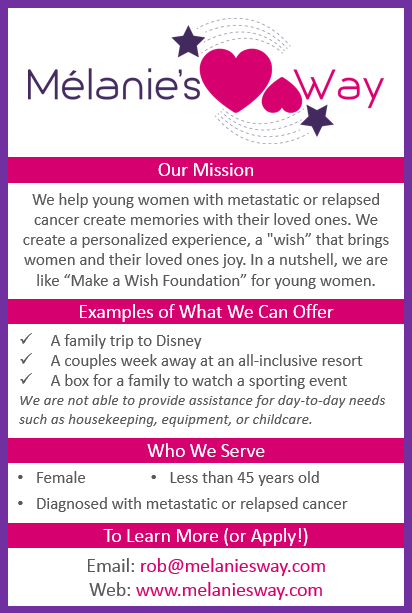Melanie’s way is an organization that grants wishes to young women under 45 diagnosed with a metastatic or relapsed cancer. If you know anyone who could benefit from this, please share this with them!

Learn about Melanie's Way »
Metastatic breast cancer is often misunderstood or silenced by those who fear it due to lack of knowledge, information and education.
Learn about metastatic breast cancer with Rethink Breast Cancer »
LivingOutLoud.Life is a new, free international digital health tool to support young adults living with advanced illness.
"My friends don't want to talk about the fact that I'm scared that I'm going to die, they don't want to hear about it, it's not going to happen but it is going to happen and I want to talk about it." - Jayda Kelsall
Young adults and teens with advanced illness have been virtually invisible in health care systems and online - until now, with the launch of LivingOutLoud.Life, the world's first online platform dedicated to supporting and empowering young adults and teens living with advanced illness. Fourteen young adults share deeply personal stories about living day-to-day with advanced illness and with end of life. Their stories are unscripted, unfiltered and unforgettable, offering help when it is needed most. Leading health experts from Canada and the US have also contributed content to the site.
The young people share their experiences of pursuing education and careers, navigating impacts on sexuality and fertility, managing relationships, decisions about their care or treatments, dealing with symptoms and confronting end of life. Families, friends and health providers can gain a better understanding by viewing their stories.
The site is also an excellent resource for families, friends, and health providers seeking a better understanding of what it is like to be young and to navigate issues that arise when living with limited time.
LivingOutLoud.Life is the result of a collaboration between The Canadian Virtual Hospice, young Canadians living with advanced illness, The Canadian Partnership Against Cancer, The Thomas Sill Foundation, Young Adult Cancer Canada, and Team Shan Breast Cancer Awareness for Young Women.
For more information, email
Marissa@virtualhospice.ca
Visit
LivingOutLoud.Life »
Visit
VivreAFond.ca for the French version of the site.
